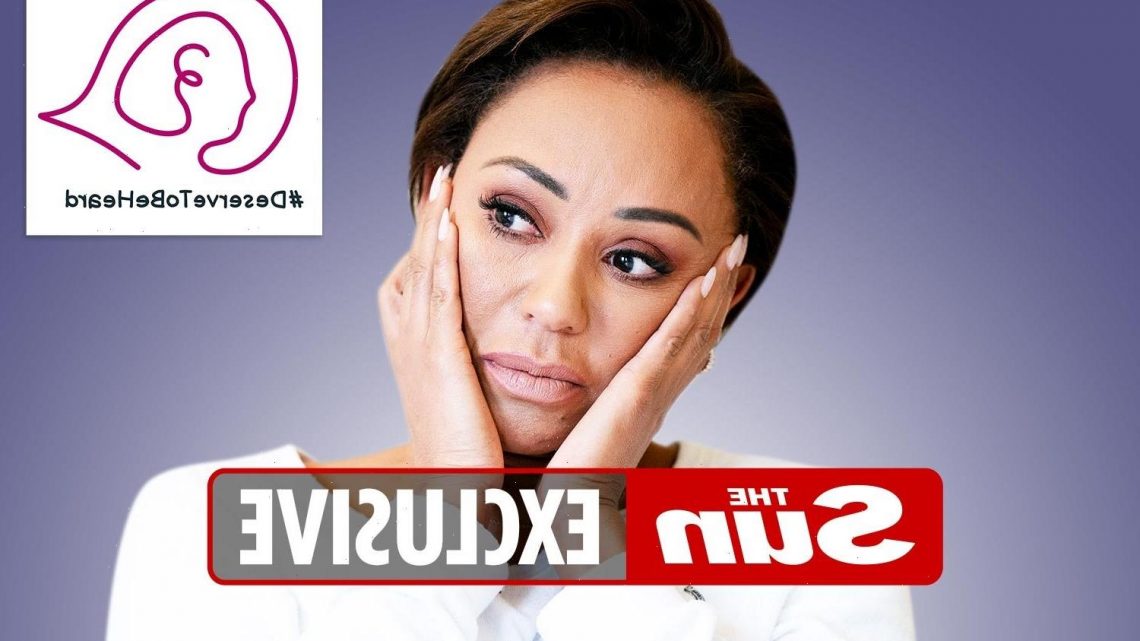
I woke up trembling from night terrors for years after leaving my abusive ex, says Mel B
09/10/2021NEARLY half of all women in domestic abuse refuges suffer poor mental health as a result of the horrors they have been through.
The charity Women’s Aid is launching the Deserve To Be Heard campaign to urge the Government to commit funding for mental health support, both in refuges and community domestic abuse services.
Spice Girl Melanie Brown, 46, a Patron of Women’s Aid and a mum of three, is backing the initiative.
Here Mel, who will be meeting MPs on Tuesday to discuss the issue, writes exclusively on why support is so vital.
PARALYSED with fear, I woke up trembling from another nightmare.
I couldn’t breathe until I knew that I was safe and my girls were safe.
This happened for years after I left my abusive partner – but this is the reality of surviving an abusive relationship.
Leaving is not the end point, as the trauma affects your mental health and sense of safety.
It was not just the nights, but the daily anxiety and feeling of being watched, monitored and trapped.
Flashbacks from living in a coercively controlling relationship are constant, as is the need to find order in your own life.
I found myself writing lists and reordering my clothes and belongings.
I wanted to literally physically scrape myself clean of my abusive ex-partner, but it’s harder to scrape away the memories and start to repair the emotional damage.
I’m best known as a Spice Girl, a TV judge and presenter and for being confident and outspoken as Scary Spice.
I feel at home on stage and I’m sure, to many people, I would be the last person they could imagine feeling totally trapped and alone in an abusive marriage.
I campaign for other survivors and use my voice to help make a difference.
Yet I experienced a coercively controlling relationship for ten years that left me with post-traumatic stress disorder (PTSD) and horrendous anxiety.
After writing my 2018 book Brutally Honest, with my best friend Louise Gannon, I was asked to become a patron for Women’s Aid, which was one of the proudest moments of my life.
I campaign for other survivors and use my voice to help make a difference.
And next week I will be in Parliament, launching the Deserve To Be Heard campaign, which will focus on the impact of domestic abuse on mental health.
I know from personal experience that all survivors need and deserve support services for mental health, so they can recover from the abuse and damage that leave too many women at their lowest point.
New statistics by Women’s Aid tell us that more than 45 per cent of women living in refuge services reported feeling depressed or having suicidal thoughts as a result of the domestic abuse they had experienced.
This is thought to be the tip of the iceberg, as so many women are worried about speaking out concerning their mental health in case they are judged or their children are taken from them.
When you speak out about abuse you can be belittled and disbelieved.
There is an assumption that because I had a successful career, I couldn’t be financially abused, but I didn’t have access to my own money while I was married.
I hope that by sharing my experiences I will help other women by encouraging more people to talk about domestic abuse and how it can affect your mental health — and your children’s mental health.
I was left with almost nothing, an empty bank account after years of hard work.
The thought of losing your home and financial security can be a huge barrier to leaving, and money worries can make you even more stressed and anxious.
Through the Deserve To Be Heard campaign we are asking the Government to listen to survivors and fund local domestic abuse services, including specialist mental health support.
The Health and Care Bill 2021-22, currently at committee stage in the House of Commons, is a vital opportunity to highlight women’s experiences and the support they desperately need after leaving an abusive relationship.
The Government’s Women’s Health Strategy, to improve health care for women, is also really important, because domestic abuse is the cause of many women’s mental health issues.
I hope that by sharing my experiences I will help other women by encouraging more people to talk about domestic abuse and how it can affect your mental health — and your children’s mental health.
My mum Andrea and Women’s Aid chief executive Farah Nazeer will be with me when I meet MPs in Parliament on Tuesday.
I will be delivering a letter to PM Boris Johnson about why this campaign is so close to my heart.
It will mean a lot to have my mum by my side, as I didn’t speak to her for many years while I was in a controlling relationship.
Through the Deserve To Be Heard campaign we are asking the Government to listen to survivors and fund local domestic abuse services, including specialist mental health support.
Over the past five years I have been rebuilding my relationship with my family, living close to them in Leeds.
An abusive relationship can rip apart the connections you have with your friends and family.
The effects for me have been long-lasting, and if you have a child with your abuser, going through the family courts can be traumatic.
I have received support from my local Women’s Aid services, but I know there is not enough available.
Mental health support for survivors of abuse is desperately needed, and we must listen to women who are ignored or called crazy by their abusive ex-partners.
Abusers may try to ruin your life after you leave them — the abuse doesn’t end when the relationship ends, and neither should the support.
All survivors deserve to be heard, and get the help they urgently need.
How you can get help:
Women's Aid has this advice for victims and their families:
- Always keep your phone nearby.
- Get in touch with charities for help, including the Women’s Aid live chat helpline and services such as SupportLine.
- If you are in danger, call 999.
- Familiarise yourself with the Silent Solution, reporting abuse without speaking down the phone, instead dialing “55”.
- Always keep some money on you, including change for a pay phone or bus fare.
- If you suspect your partner is about to attack you, try to go to a lower-risk area of the house – for example, where there is a way out and access to a telephone.
- Avoid the kitchen and garage, where there are likely to be knives or other weapons. Avoid rooms where you might become trapped, such as the bathroom, or where you might be shut into a cupboard or other small space.
If you are a victim of domestic abuse, SupportLine is open Tuesday, Wednesday and Thursday from 6pm to 8pm on 01708 765200.
The charity’s email support service is open weekdays and weekends during the crisis – [email protected].
Women’s Aid provides a live chat service – available every day from 10am-6pm.
You can also call the freephone 24-hour National Domestic Abuse Helpline on 0808 2000 247.
Source: Read Full Article



